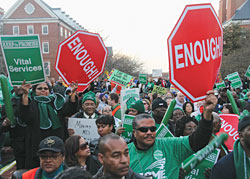NEWS ROUNDUP
Public layoffs, public safety, privatized ballots…
PUBLIC LAYOFFS
► In today’s Seattle Times — State estimates 18,400 jobs lost in September, but jobless rate declines — About 10,800 of the jobs lost were in government, mainly in K-12 and higher education as budget cuts took effect.
► In today’s (Everett) Herald — Municipal budgets: Duress at City Halls — To control labor costs, cities are laying off workers, implementing furloughs or holding open positions when employees leave. “Do more with less” works to a point. People still expect the potholes filled and phones answered, even if there are fewer government employees.
► In today’s Spokesman-Review — Crowd decries social, health services cuts –Despite making more than $2.2 billion in cuts to social services in the past two years, DSHS chief Susan Dreyfus tells an emotional crowd of about 400 people overflowing the DSHS office in Spokane Valley, “Additional reductions are inevitable.”
 ► At AFL-CIO Now — Local public employee layoffs fuel vicious cycle of unemployment crisis — The attack on public workers at the state level has been big news: the words “Wisconsin” and “Ohio” have become shorthand for a national right-wing legislative strategy designed to beat up unions and their members. But at the local level, things are even worse. Since 2008, municipal and county governments have shed a total of 535,000 jobs, losses that have negatively offset any job-generating progress made in the private sector.
► At AFL-CIO Now — Local public employee layoffs fuel vicious cycle of unemployment crisis — The attack on public workers at the state level has been big news: the words “Wisconsin” and “Ohio” have become shorthand for a national right-wing legislative strategy designed to beat up unions and their members. But at the local level, things are even worse. Since 2008, municipal and county governments have shed a total of 535,000 jobs, losses that have negatively offset any job-generating progress made in the private sector.
► In today’s NY Times — Warning by states as tax revenues fail to rebound — It’s not just Washington that’s short of revenue. Other large states face similar problems, a clear sign that they are still not out of the woods several years after the housing bubble burst, the recession began and many states made big spending cuts. The states are collecting more in taxes than last year, but not as much as they did before the recession began, and not as much as they expected when they drew up their budgets last spring.
PUBLIC SAFETY
► At AFL-CIO Now — Teacher/First Responder bill reverses growing public safety risk — Across the country, tens of thousands of firefighters, paramedics and teachers have been laid off and the jobs of tens of thousands more are under threat. The just-introduced Teachers and First Responders Act (S. 1723), would provide funds to local governments to put back to work or keep on the job some 400,000 teachers and first responders. It mirrors a provision in President Obama’s American Jobs Act that Senate Republicans blocked with a filibuster last week.
► In The Hill — Biden: Republicans protect the rich at expense of teachers, responders — Frustrated Democrats in the Senate embraced Biden’s fiery remarks. They privately credit Biden with filling a major void in the Obama White House.
ELECTION
 ► In today’s Seattle Times — Costco’s $22M for I-1183 sets record — Costco Wholesale has dumped $8.9 million more into its liquor-privatization initiative, bringing its total contributions to more than $22 million. Other donors have given less than $250,000 altogether to I-1183.
► In today’s Seattle Times — Costco’s $22M for I-1183 sets record — Costco Wholesale has dumped $8.9 million more into its liquor-privatization initiative, bringing its total contributions to more than $22 million. Other donors have given less than $250,000 altogether to I-1183.
► In today’s Seattle Times — I-1125: Tim Eyman’s bundle of bad ideas (Joni Balter column) — A region trying to resuscitate itself economically should not blindly follow a political mercenary like Eyman who knows little about transportation. Transportation planning and financing are complicated. They don’t lend themselves to the bumper-sticker simplicity of a citizen initiative. Voters should look carefully at this mosh pit of colliding ideas and vote no, as in, no thanks.
► At NWProgressive.org — State has always trusted experts panel to set tolls — why change that with I-1125? — If implemented, I-1125 would require the state to abandon an important tradition. For many decades, we’ve always trusted an expert commission to set toll rates. I-1125 would make Washington the only state to politicize this process by putting toll-setting into state legislators’ hands.
BOEING
► In today’s Seattle Times — Customs turns back Russian engineers working for Boeing — Border officials at SeaTac Airport denied entry Friday to 15 Russian engineers from Boeing’s Moscow Design Center and sent them back to Russia. The incident caused the company to suspend U.S. travel for other engineers from Russia “until Boeing can determine the appropriate way to proceed,” said a spokesman. SPEEA says the engineers were not Boeing employees but lower-paid contractors. The engineers’ union has asked the State Department for several years about the validity of Boeing’s use of temporary-visitor visas, alleging that Russian contractors violate the terms by working for Boeing while in the U.S.
► In The Hill — Chamber hits NLRB with ad campaign — Slated to run in Florida, Pennsylvania and Virginia, the ads take issue with the labor board’s April 20 complaint against Boeing for allegedly retaliating against union workers.
LOCAL
 ► In today’s (Longview) Daily News — Longshoremen approve new agreement with regional grain elevators — ILWU dock workers approve a new one-year agreement with six Pacific Coast grain exporters that includes pay increases, full medical benefits and a pension plan. The EGT grain terminal at the Port of Longview is not included in the agreement.
► In today’s (Longview) Daily News — Longshoremen approve new agreement with regional grain elevators — ILWU dock workers approve a new one-year agreement with six Pacific Coast grain exporters that includes pay increases, full medical benefits and a pension plan. The EGT grain terminal at the Port of Longview is not included in the agreement.
EDITOR’S NOTE — Taxpayer-subsidized EGT has said the ILWU contract is too generous to workers. The company initially claimed it would save $1 million a year by hiring non-union workers, a figure EGT later admitted had been plucked from the sky. Now, EGT has hired a contractor with workers represented by the Oregon-based IUOE Local 701 to run the grain elevator, presumably for less money, and has sued the Port of Longview to exempt itself from the Port’s contract with the ILWU.
► In today’s Columbian — C-Tran, ATU 757 head to arbitration — With labor negotiations long at an impasse, C-Tran and ATU Local 757 are headed toward third-party arbitration for the first time. The most recent agreement expired in August 2010. But more than a year of negotiation and mediation has produced no solution.
► In today’s News Tribune — Regence makes headway in government retirees’ claims — In August, doctors were awaiting about 300,000 payments from the state’s Uniform Medical Plan managed by Regence, mostly for treatment of retired public employees who use the plan as a supplement to Medicare. That 300,000 backlog is down to 155,000, the state says.
► In today’s Tri-City Herald — Hanford worker goes for a wild ride in portable toilet — A forklift operator learned the value of knocking first after he moved a Hanford portable toilet with a Teamster still in it.
OCCUPY WASHINGTON
► In The Stranger — Occupy Seattle’s Big Week — The Occupy movement’s challenge: The factions are sufficiently splintered—unable to agree on their tactics, their location, or their leadership. Last week at least, the protests in Seattle appeared directionless. But it didn’t fizzle. This past week, Occupy Seattle started to find its footing.
► In today’s Columbian — Occupy Vancouver event 20th largest in the nation — With a showing of nearly 700 protesters, the Occupy Vancouver protest outdid many more populous cities to rank 20th for turnout among similar events held Saturday across the nation, according to the New York Times.
► Washington’s Occupy protests on Facebook: Occupy Bellingham – Occupy Olympia – Occupy Seattle (website) – Occupy Spokane – Occupy Tacoma – Occupy Tri-Cities – Occupy Wenatchee – Occupy Yakima
NATIONAL
► In today’s Sandusky Register — Efforts to kill private-sector unions faltering — Not content to target only public-sector unions, Republican lawmakers in more than one-quarter of the states this year launched their most ambitious attempt in about generation to break up union shops in factories, offices and other private-sector workplaces. But their efforts have largely faltered.
► At Politico — Labor lags in new fundraising world — Organized labor is lagging behind in adapting to the seismic changes that reordered the campaign finance landscape in 2010. So far this year, unions have been slow to coordinate their spending strategy under the new campaign rules. They don’t appear to have clear fundraising goals. Many say they’re planning to stick with the same tactics they’ve turned to in the past, even after a bruising 2010 election.
► In today’s NY Times — Ford workers ratify contract, despite show of displeasure –The UAW said the contract passed, 63%-37%. As a result, most workers will get $6,000 signing bonuses, followed shortly by profit-sharing checks averaging $3,750. “The members walked right to the very edge of a cliff, and they looked over and decided to take a step back,” said one labor expert. “It’s pretty hard nowadays for a worker to risk not getting a signing bonus and have to explain that to a spouse.”
► In today’s NY Times — It’s what they asked for (editorial) — The pain from Alabama’s harsh new anti-immigration law isn’t felt just by the undocumented. Native Alabamans are paying a high price as well. The state’s reputation has also taken a huge hit just when it is trying to lure international businesses. No matter how officials may try to tempt foreign automakers with low taxes and wages, Alabama is already infamous as a regional capital of xenophobia.
TODAY’S MUST-READ
 ► In the Oregonian — Trade agreements: Who really benefits and loses? (by Oregon AFL-CIO’s Barbara Byrd) — Last week, Congress passed three trade agreements that will have devastating consequences for workers in Oregon and nationally. These three agreements — treaties with Korea, Panama and Colombia — have been promoted with grossly inflated estimates of their job creation potential. We know better. Jobs will be lost, and they will be good, family-wage jobs — primarily in manufacturing. Remember these votes as Oregon continues to lose jobs to global competition, as wages fall in our state and as the gap between rich and poor continues to grow.
► In the Oregonian — Trade agreements: Who really benefits and loses? (by Oregon AFL-CIO’s Barbara Byrd) — Last week, Congress passed three trade agreements that will have devastating consequences for workers in Oregon and nationally. These three agreements — treaties with Korea, Panama and Colombia — have been promoted with grossly inflated estimates of their job creation potential. We know better. Jobs will be lost, and they will be good, family-wage jobs — primarily in manufacturing. Remember these votes as Oregon continues to lose jobs to global competition, as wages fall in our state and as the gap between rich and poor continues to grow.
The Stand posts links to Washington state and national news of interest every weekday morning by 9 a.m. Make this electronic “clip service” your first stop each morning! These links are functional on the date of posting, but sometimes expire.





